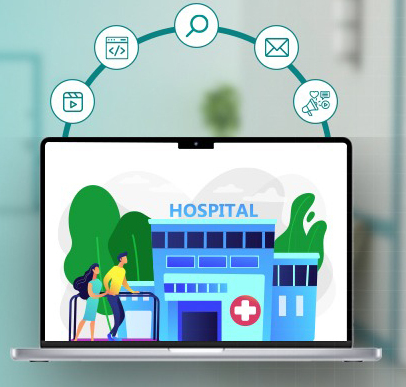Healthcare marketing in 2025 is no longer about guesswork or blanket promotions. Leading agencies are leveraging advanced analytics, real-time patient data, AI-powered tools, and machine learning to refine campaigns, personalize experiences, and improve ROI. Data has become the cornerstone of digital transformation in the healthcare sector.
1. Predictive Analytics for Patient Acquisition
Top-performing digital marketing agencies for healthcare now utilize predictive analytics to identify and target patients who are most likely to convert. By analyzing historical patient data, demographic trends, and behavioral insights, marketing strategies are tailored with precision. This allows clinics and hospitals to optimize ad spend and reduce acquisition costs.
2. Real-Time Campaign Optimization
Campaigns are no longer set-and-forget. The best HealthCare Digital Marketing Company uses real-time performance dashboards that track CTRs, bounce rates, conversions, and cost-per-acquisition. These metrics help marketers adjust ad creatives, targeting, and placement dynamically to maximize engagement across platforms.
3. Hyper-Personalized Content Delivery
Healthcare is inherently personal, and marketing efforts must reflect this. Through AI-driven segmentation, agencies customize messaging based on user behavior, search intent, health concerns, and content interaction history. From dynamic emails to condition-specific landing pages, personalization improves response rates significantly.
4. Advanced CRM Integrations
Integrating marketing automation platforms with Electronic Health Record (EHR) systems and CRMs is essential. A digital marketing agency for healthcare ensures seamless data flow across patient journey touchpoints. This enables campaign performance tracking tied to actual patient visits and treatments, closing the attribution loop.
5. Local SEO with Precision Targeting
With the rise in “near me” searches, local SEO is a critical strategy. Agencies optimize GMB listings, manage reviews, and localize content using NAP consistency and schema markup. Voice search optimization, especially for mobile queries, is also integrated into local campaigns.
6. Data-Backed Content Strategy
Content calendars are now fueled by search intent data, competitor gap analysis, and patient FAQs. Using tools like SEMrush and Ahrefs, content topics are mapped to specific patient journeys—awareness, consideration, and decision stages. This strategy increases visibility and educates patients with evidence-backed content.
7. Conversion Rate Optimization (CRO)
CRO strategies are grounded in A/B testing, heatmaps, and behavioral analytics. Forms are simplified, CTAs are data-tested, and page load times are optimized. The goal is to reduce friction and guide users smoothly from landing pages to appointment scheduling, increasing conversions.
8. Multichannel Attribution Modeling
Modern agencies use data-driven attribution models to analyze which channels are contributing most to conversions—whether it’s paid search, organic traffic, social ads, or email campaigns. This ensures budget is allocated to high-performing platforms, and waste is minimized.
9. Marketing Automation for Patient Retention
Automation tools help deliver timely follow-ups, appointment reminders, and personalized healthcare content. These workflows are designed based on behavioral triggers and data signals, improving patient retention and satisfaction while reducing no-shows.
10. Compliance and Privacy-First Strategies
Data-driven does not mean data-compromised. HIPAA compliance and secure data management protocols are mandatory. The best HealthCare Digital Marketing Company uses encryption, anonymization, and strict access controls while handling patient data across platforms.
11. Video and Interactive Media Analytics
Video content dominates healthcare engagement in 2025. From explainer videos to patient testimonials, agencies monitor view-through rates, watch time, and interaction hotspots. These insights inform future video scripts, formats, and distribution strategies.
12. Social Listening and Sentiment Analysis
Top agencies use social listening tools to monitor patient feedback, emerging trends, and sentiment around healthcare brands. This real-time data helps craft PR responses, optimize content tone, and preemptively address patient concerns.
13. ROI-Focused PPC Campaigns
PPC is now engineered with precision using AI tools. A digital marketing agency for healthcare sets up campaigns that automatically adjust bids based on time of day, user behavior, device, and geography. Real-time reporting ensures every dollar is accountable.
14. Programmatic Ad Buying
Programmatic advertising enables real-time bidding for ad inventory across platforms. Targeting parameters include demographics, device types, browsing behavior, and even recent healthcare searches. This ensures high-quality lead generation at scale.
15. Data-Enriched Chatbot Assistants
Chatbots are powered by structured healthcare data to answer common patient queries, guide users to the right pages, and collect intent signals. This reduces bounce rates and increases session duration, aiding in lead nurturing.
16. Performance Benchmarking & Reporting
Agencies now benchmark performance not only against past campaigns but also against competitors in the same specialty and region. Dashboards highlight KPIs like cost per appointment, average patient value, and channel-specific ROI.
17. AI-Powered Visual Search Integration
Patients in 2025 often use visual search for identifying symptoms or finding nearby healthcare providers. Digital agencies integrate with platforms that support visual search while tracking image performance, impressions, and visual engagement metrics.
18. Mobile-First Experience Optimization
Mobile optimization goes beyond responsive design. Agencies build mobile-first funnel strategies, micro-content, and one-click booking functionalities. With 70% of users researching healthcare on mobile, the focus is on speed, clarity, and seamless UX.
19. Voice SEO & Smart Device Integration
Voice assistants play a big role in healthcare search behavior. Agencies optimize long-tail, conversational queries and create content that answers voice-based searches. Structured data and question-answer formats are used to capture voice snippets.
20. AI & ML for Campaign Forecasting
Using machine learning, digital agencies forecast campaign performance, patient flow, and ROI projections. These predictive models assist healthcare providers in planning budgets, resources, and promotional timelines with confidence.
Conclusion
Healthcare marketing in 2025 demands precision, personalization, and performance—all powered by data. The most successful agencies harness AI, analytics, automation, and compliance-first tools to deliver measurable results. For clinics, hospitals, and healthcare brands aiming to grow, scale, and retain patients, working with a data-driven HealthCare Digital Marketing Company or a trusted digital marketing agency for healthcare is no longer optional—it’s essential.
Pixel Studios offers specialized Digital Marketing Services tailored for healthcare organizations.
